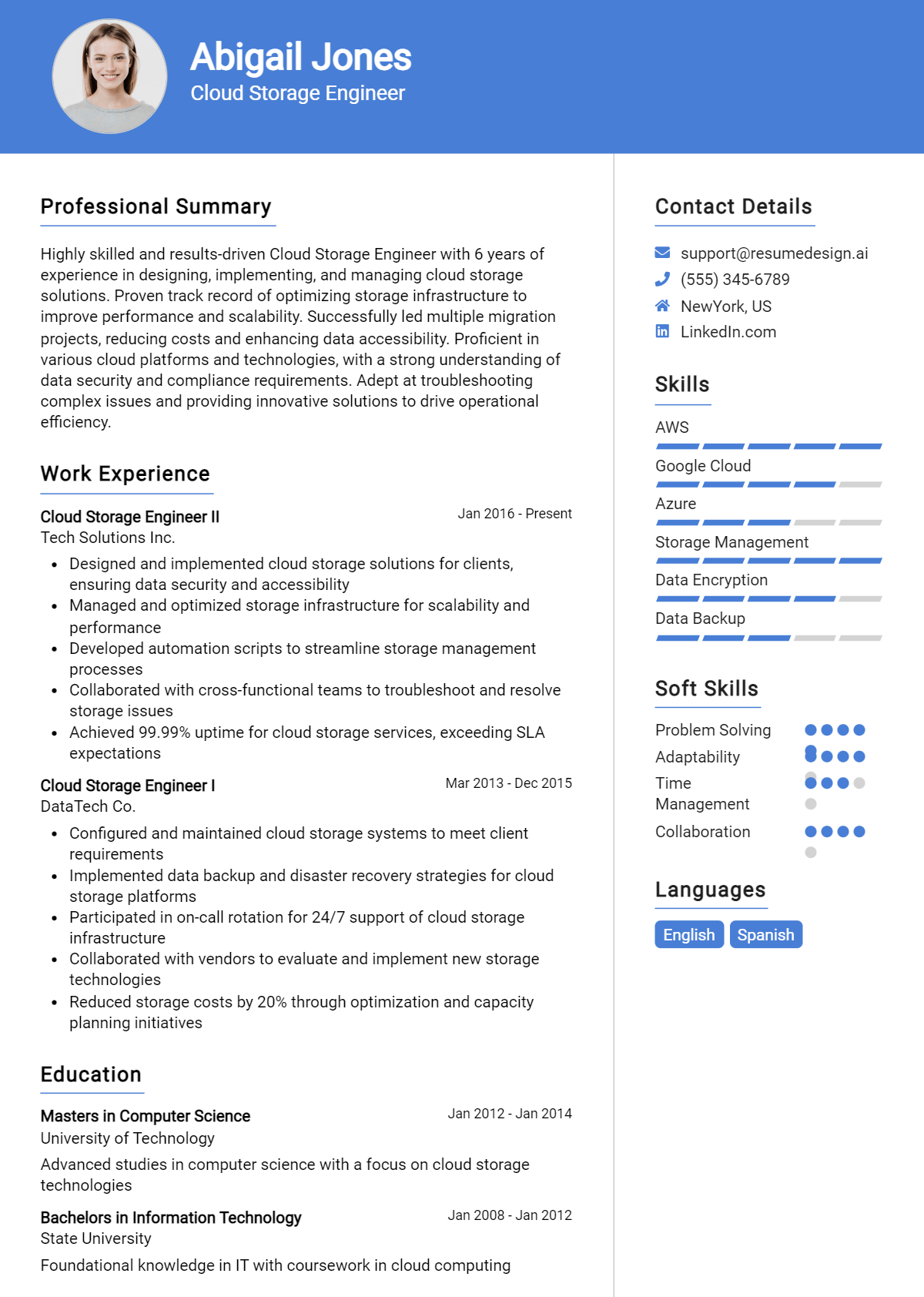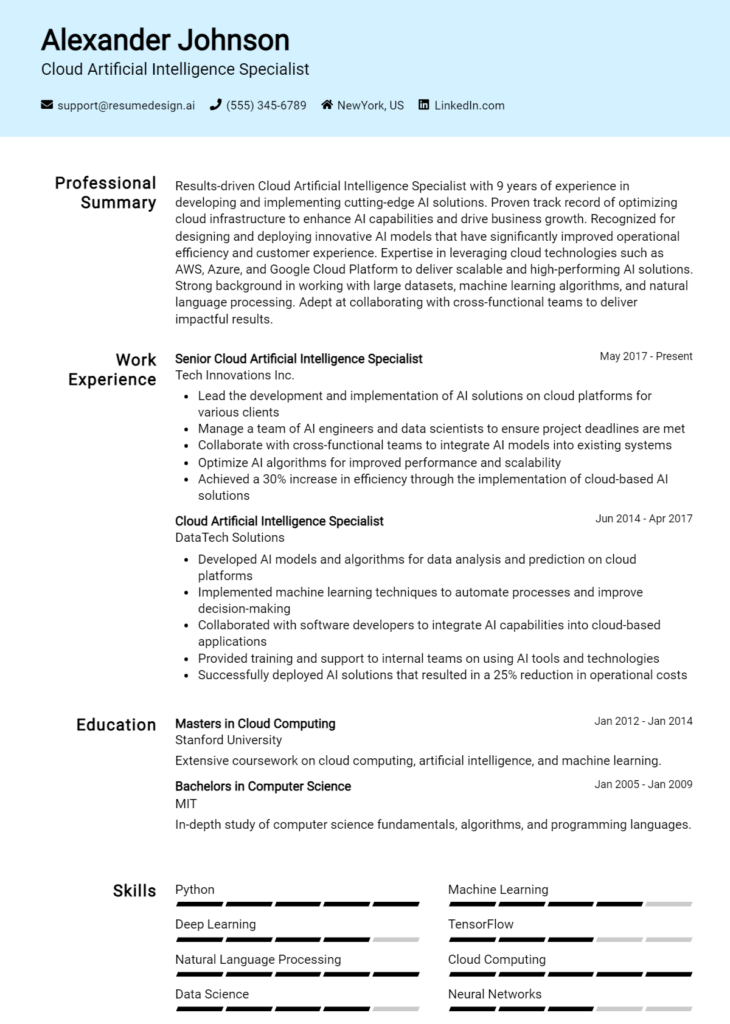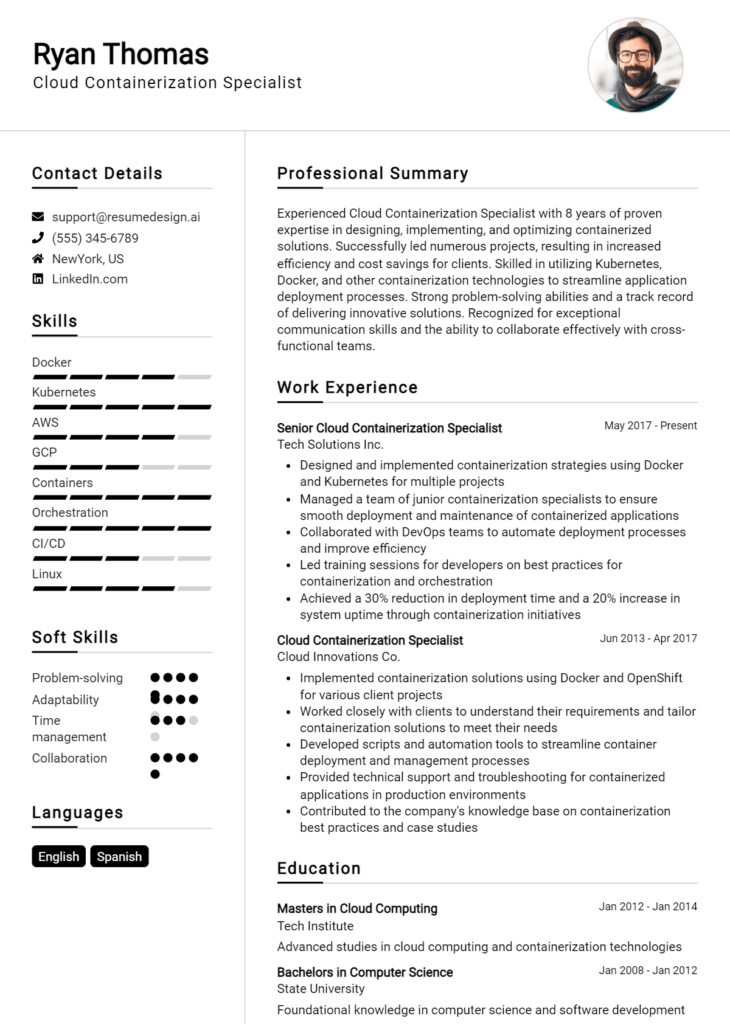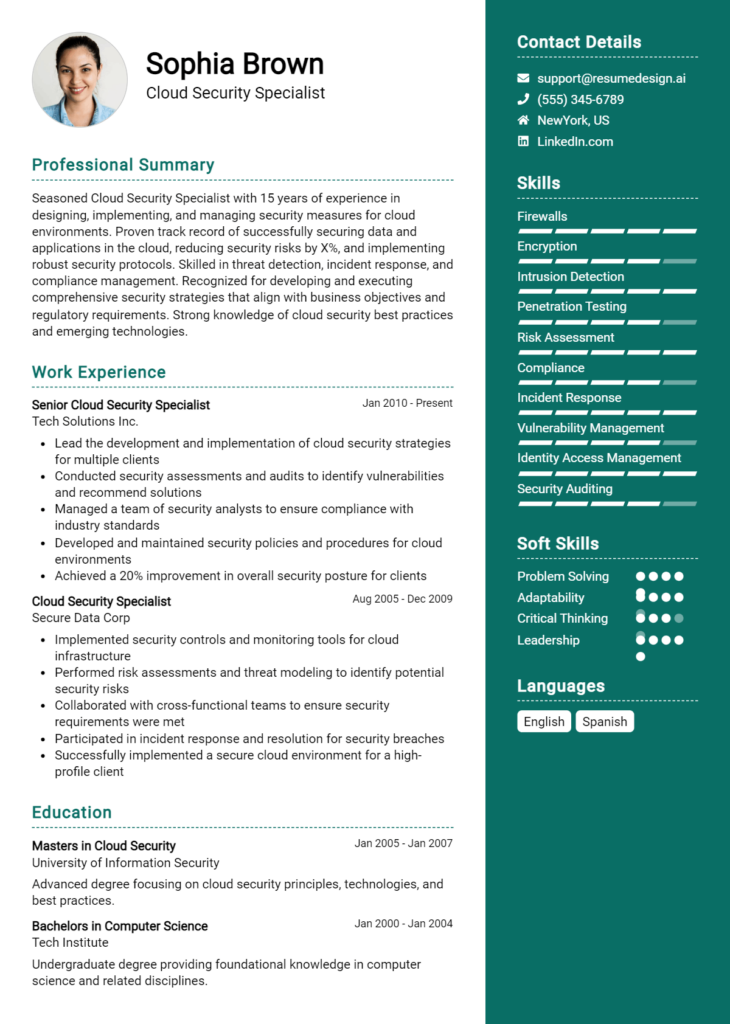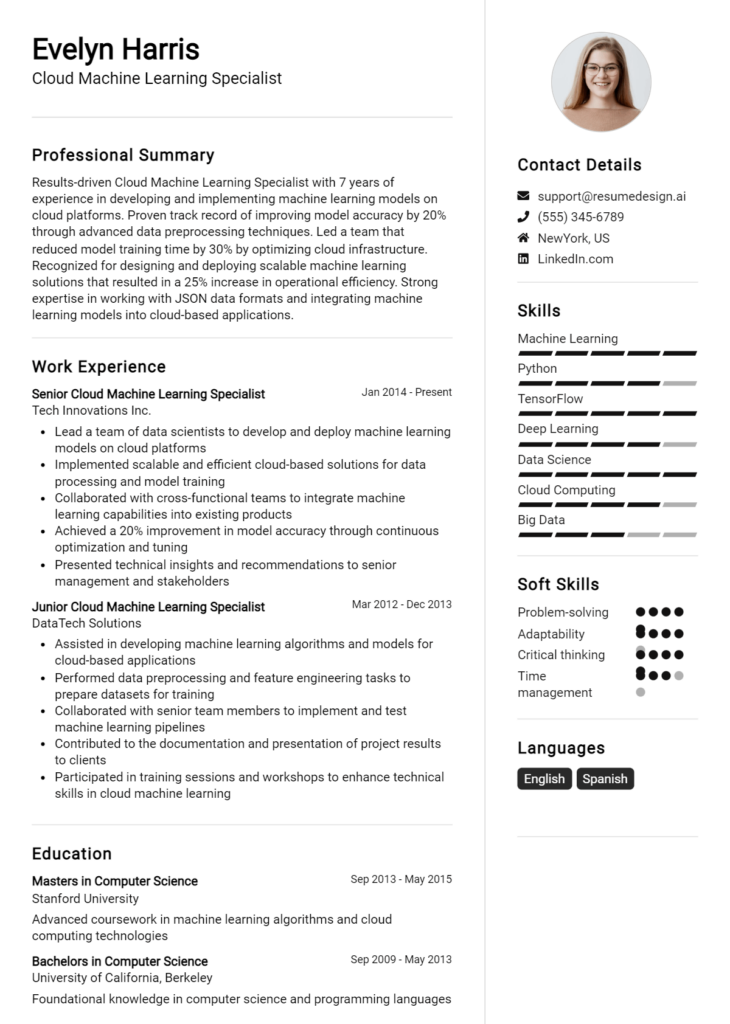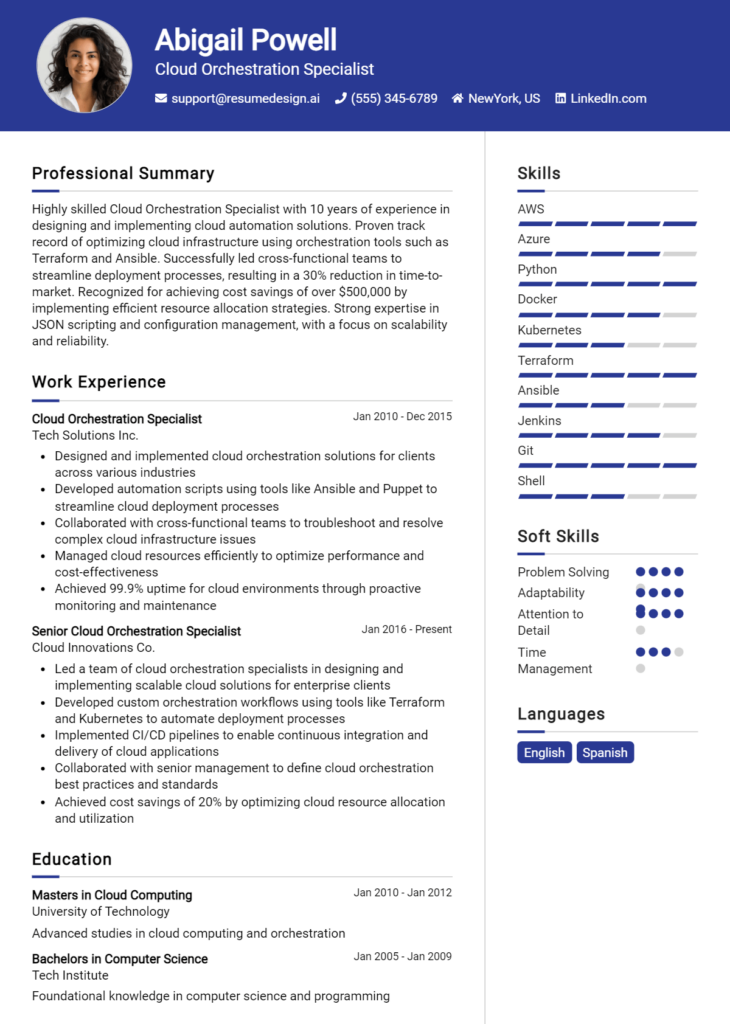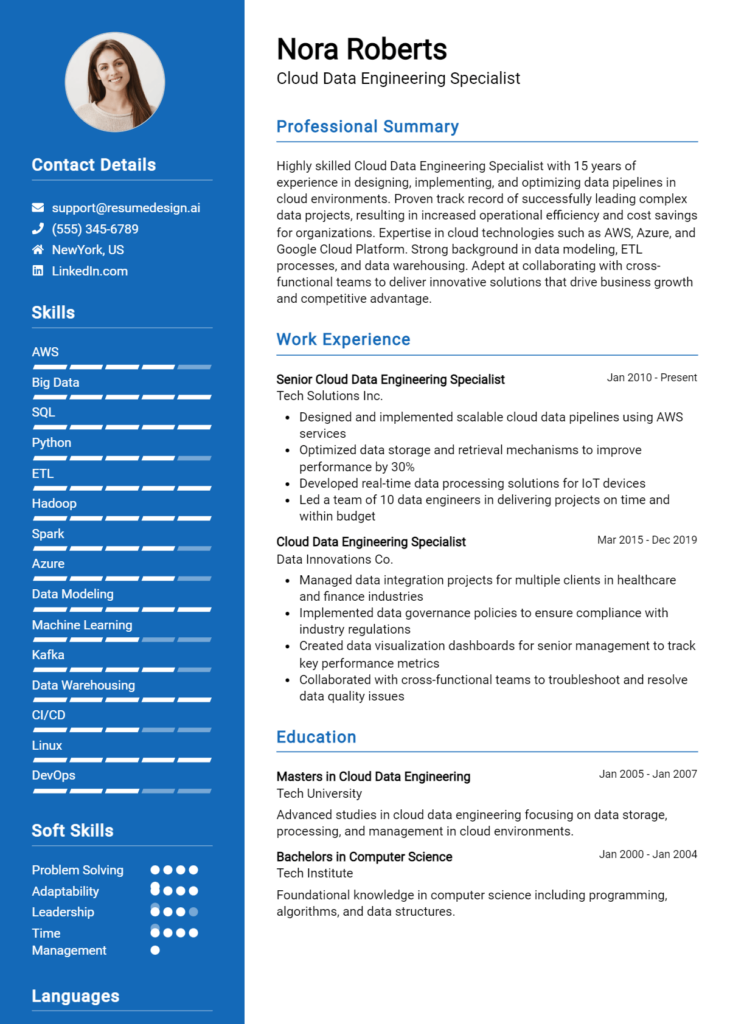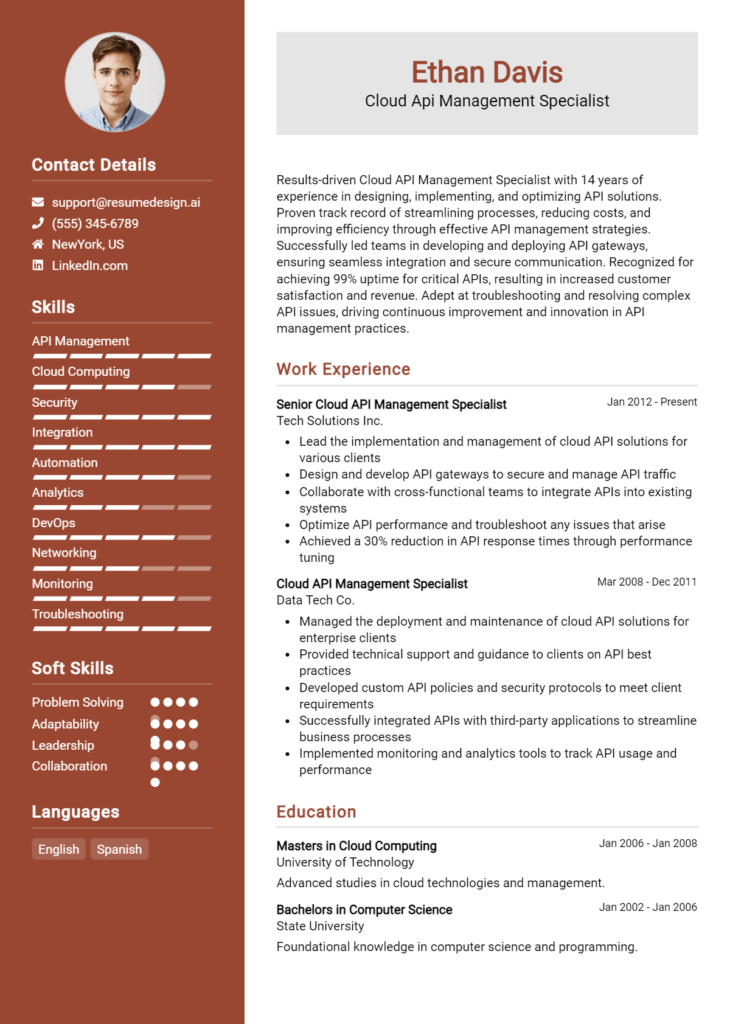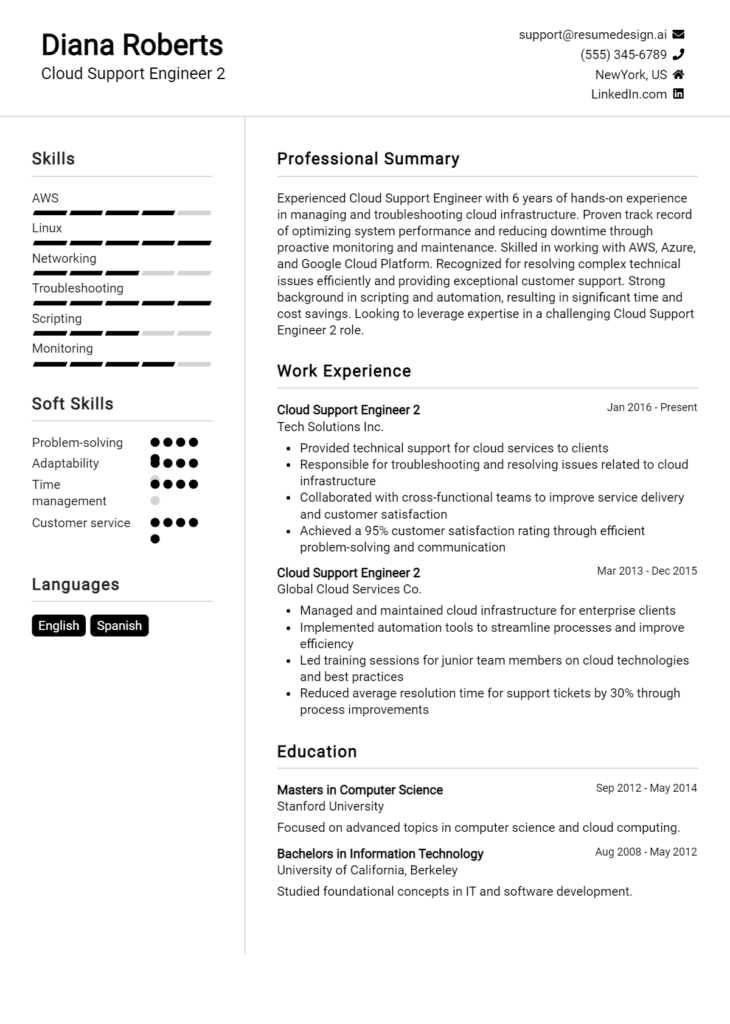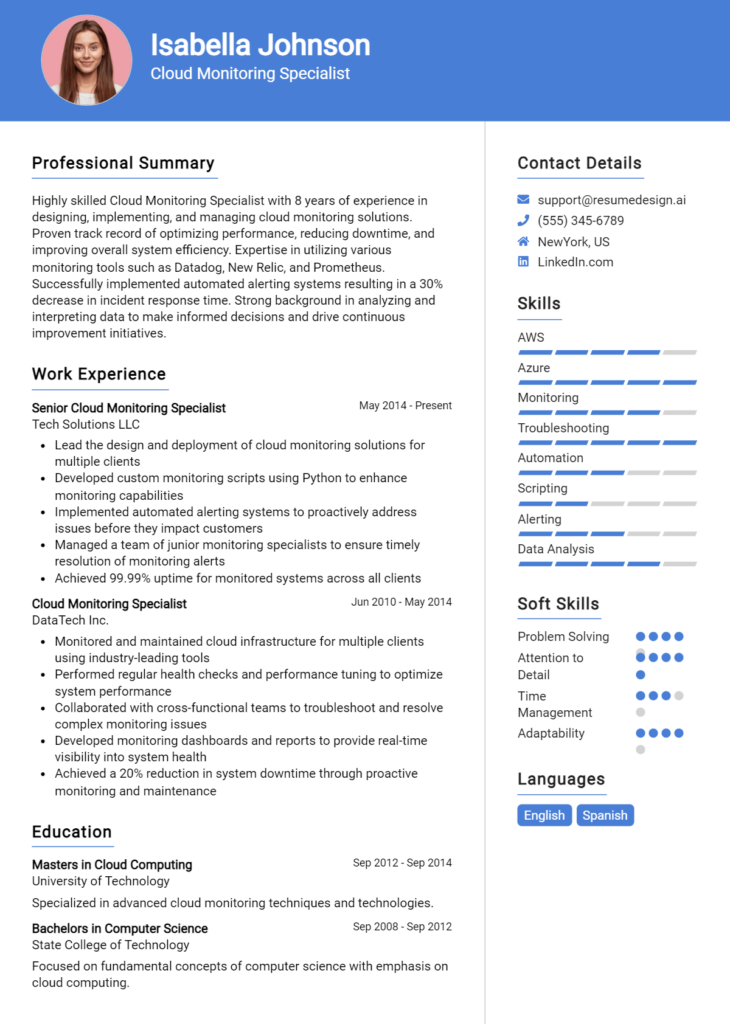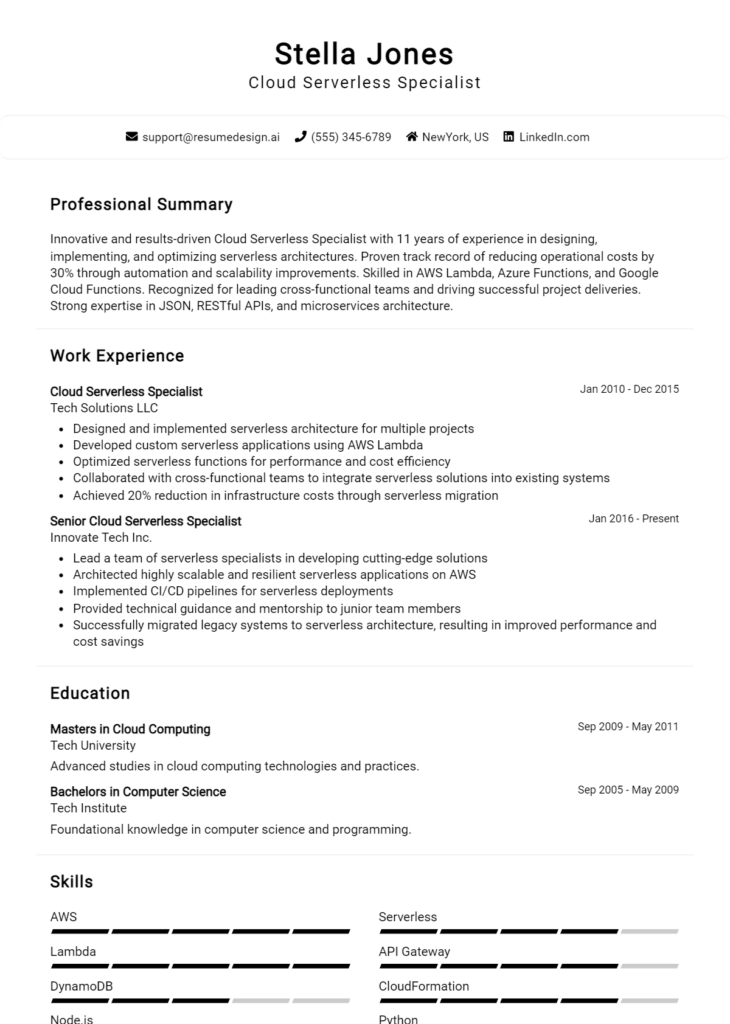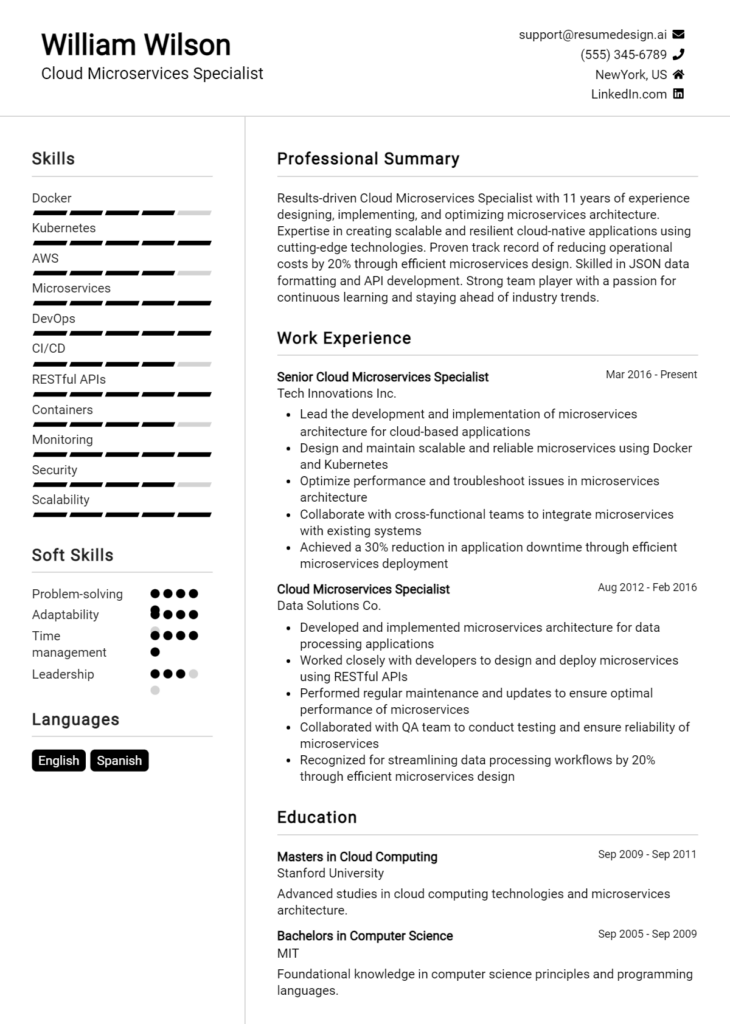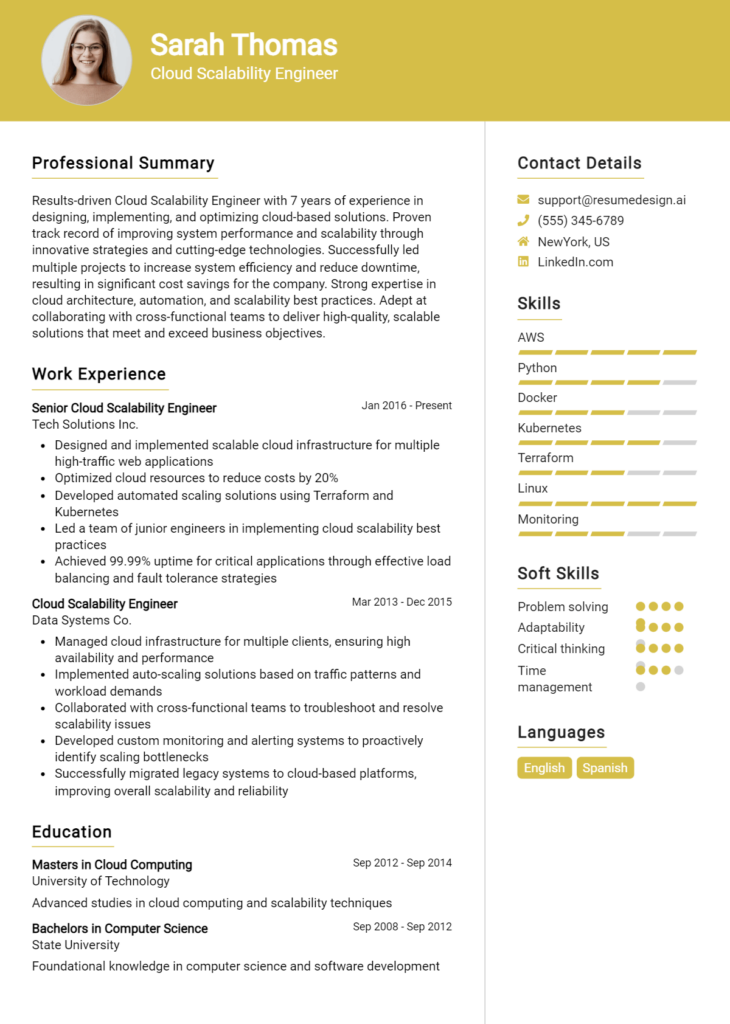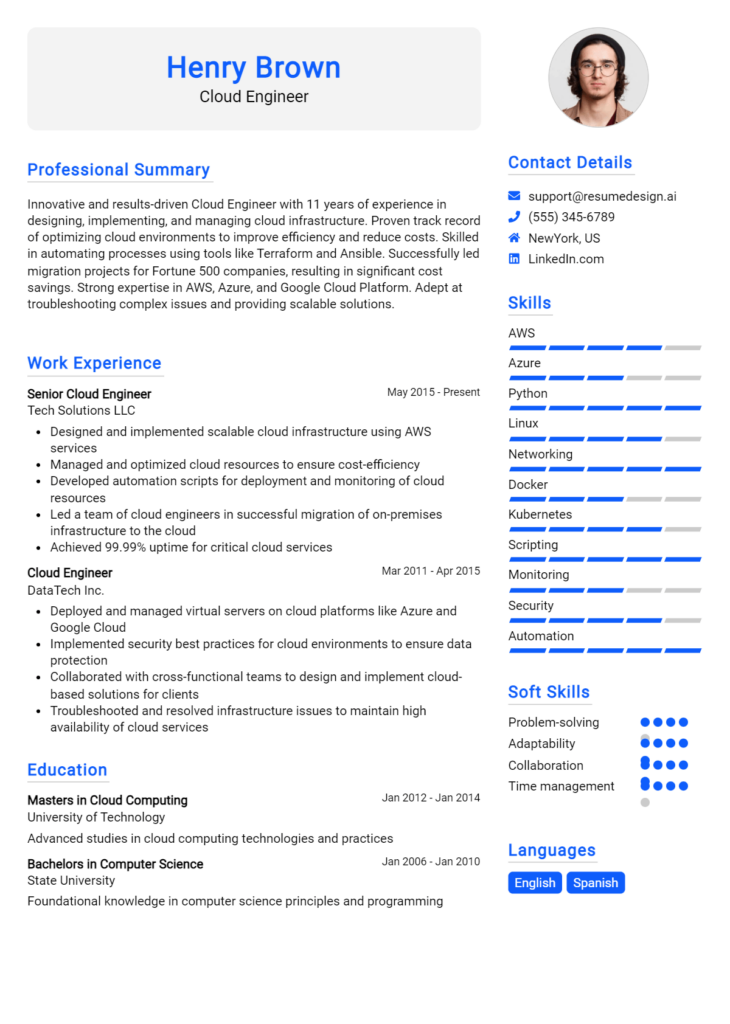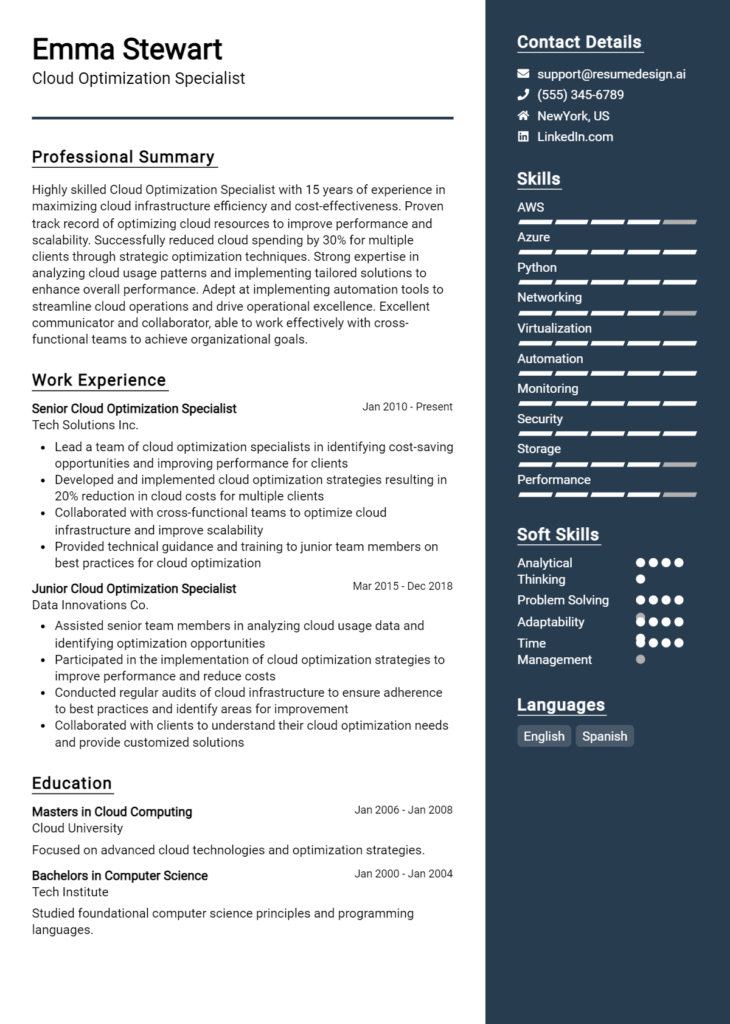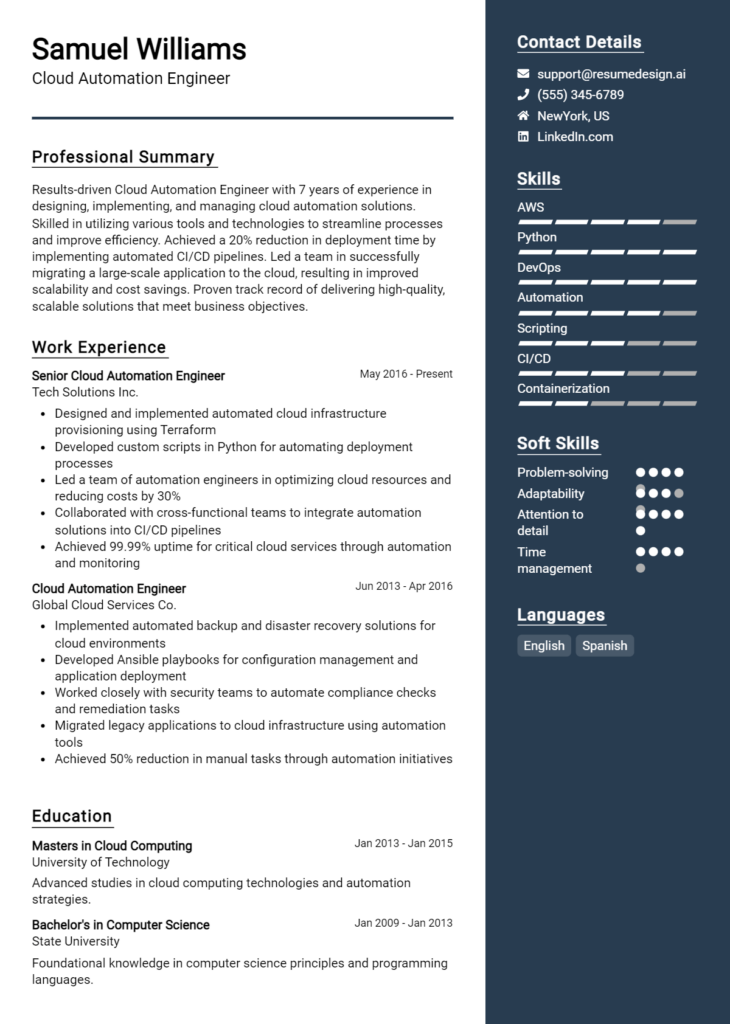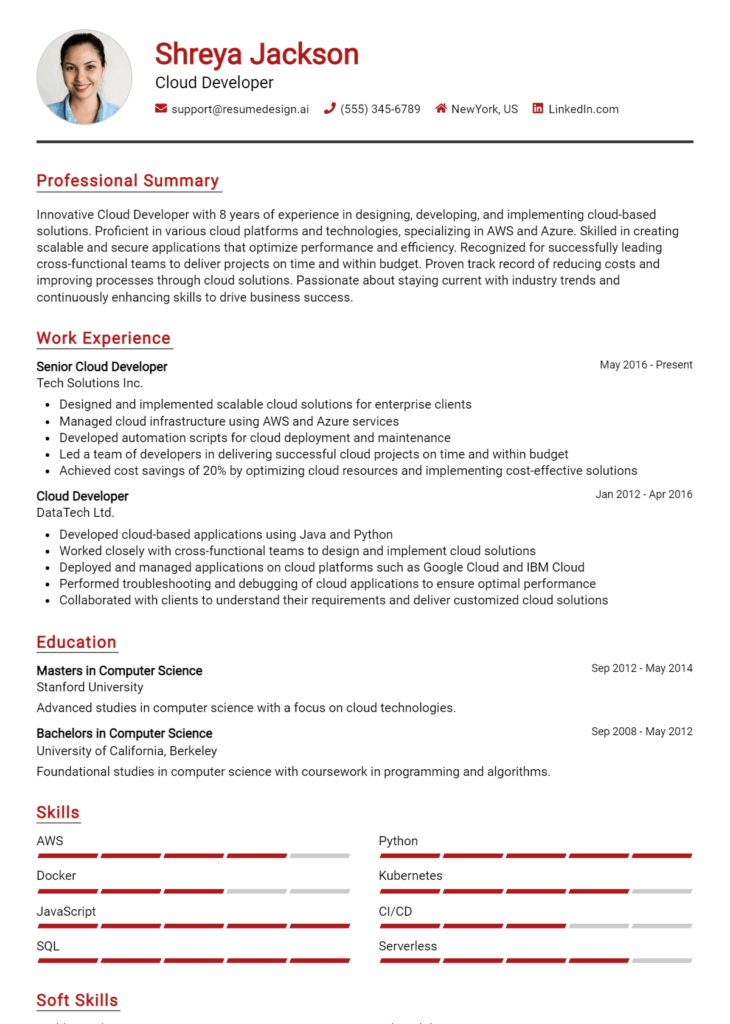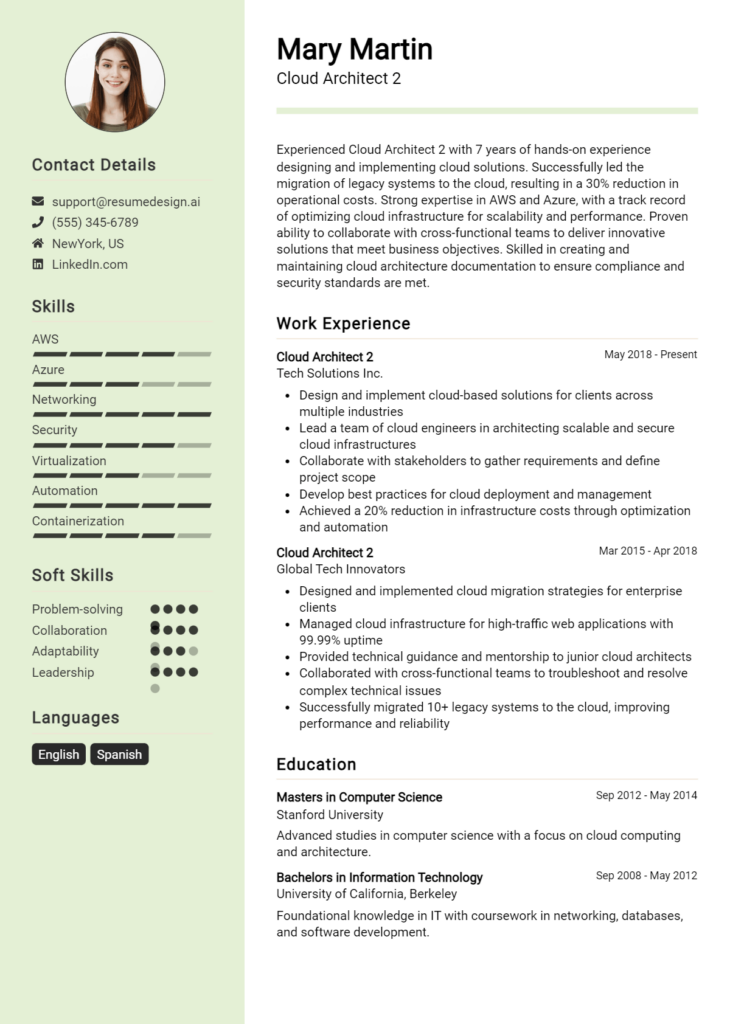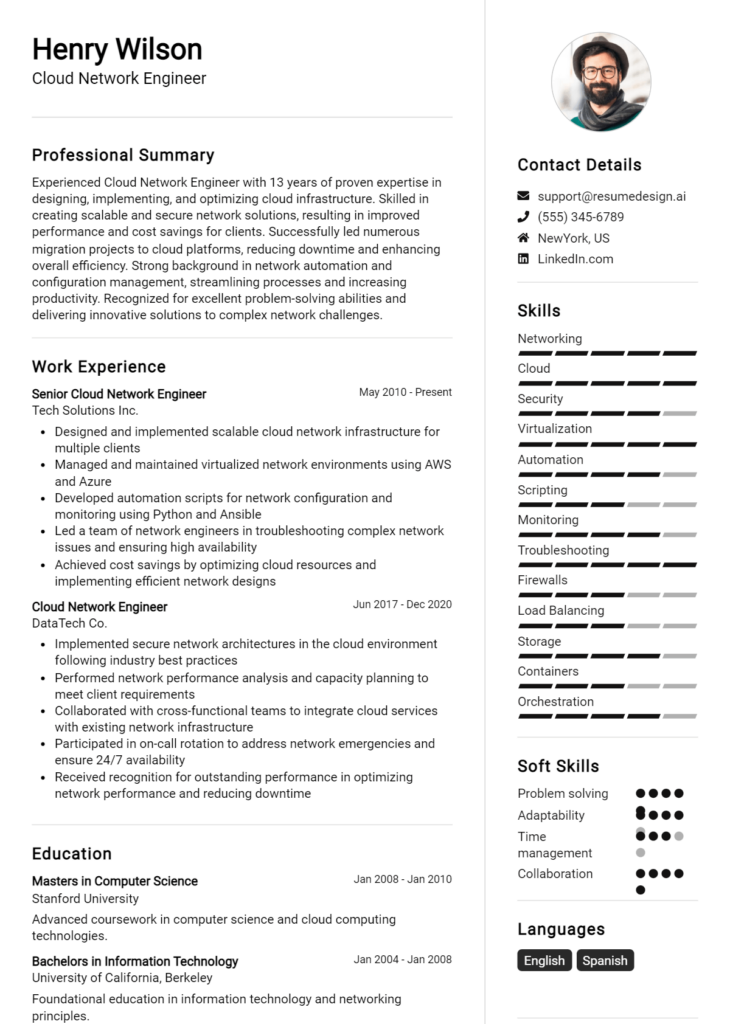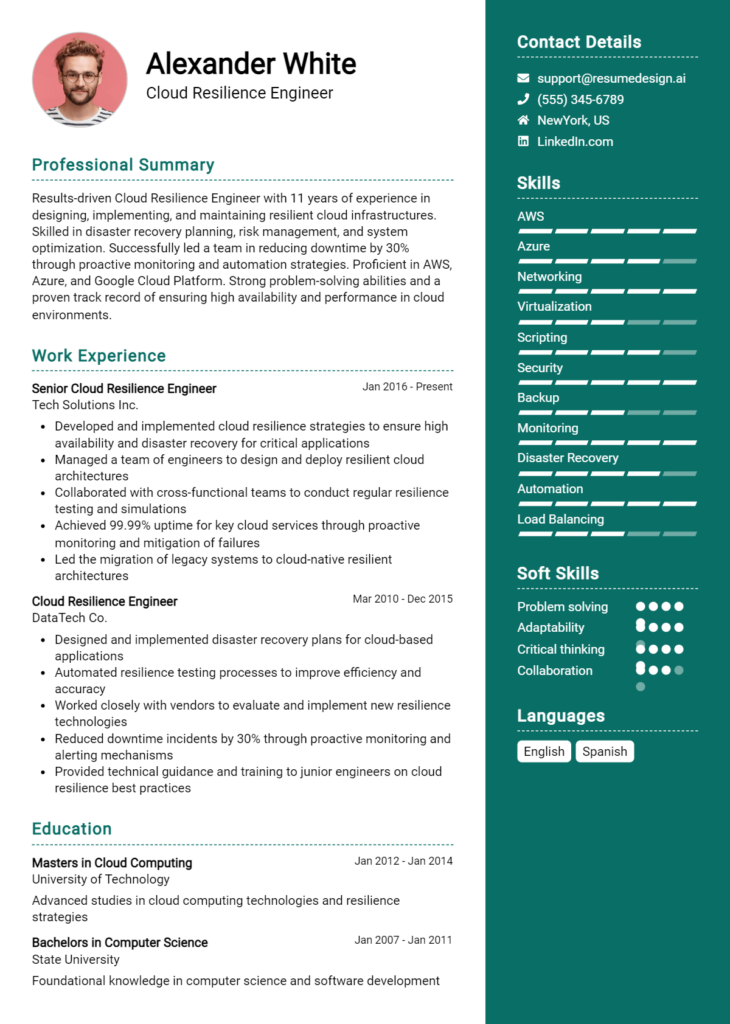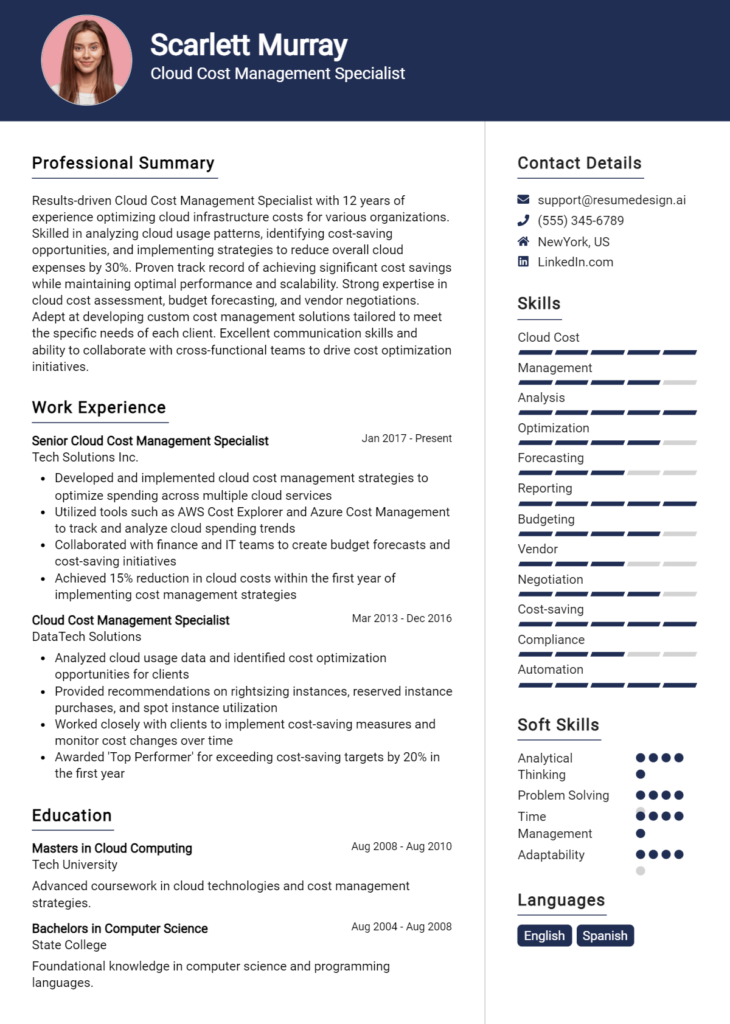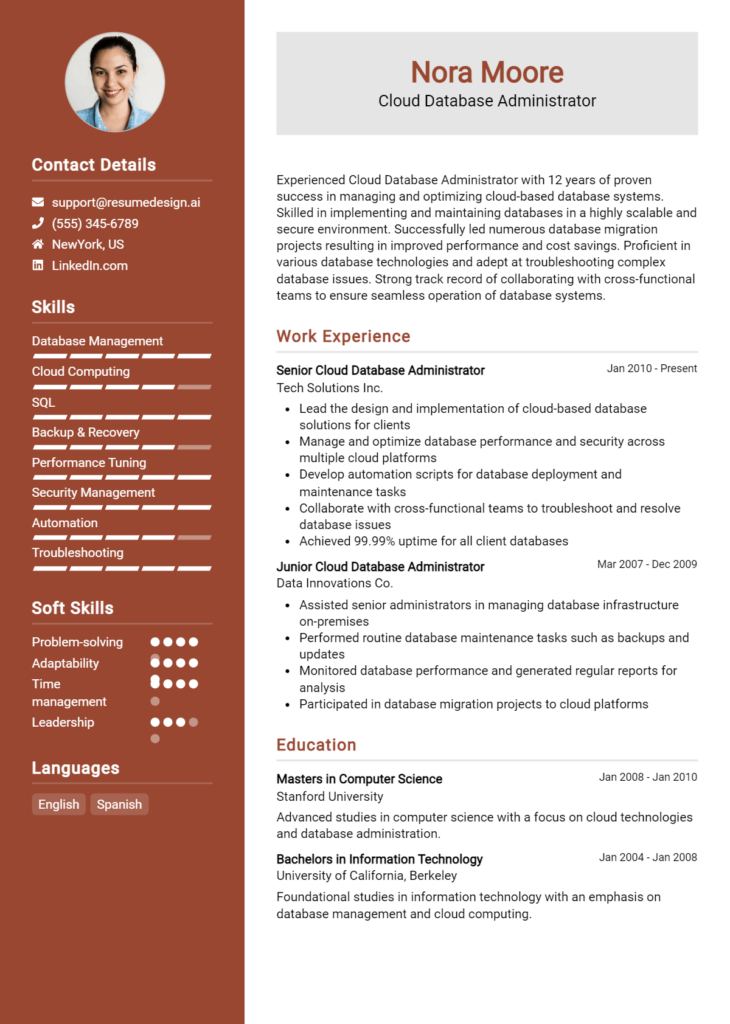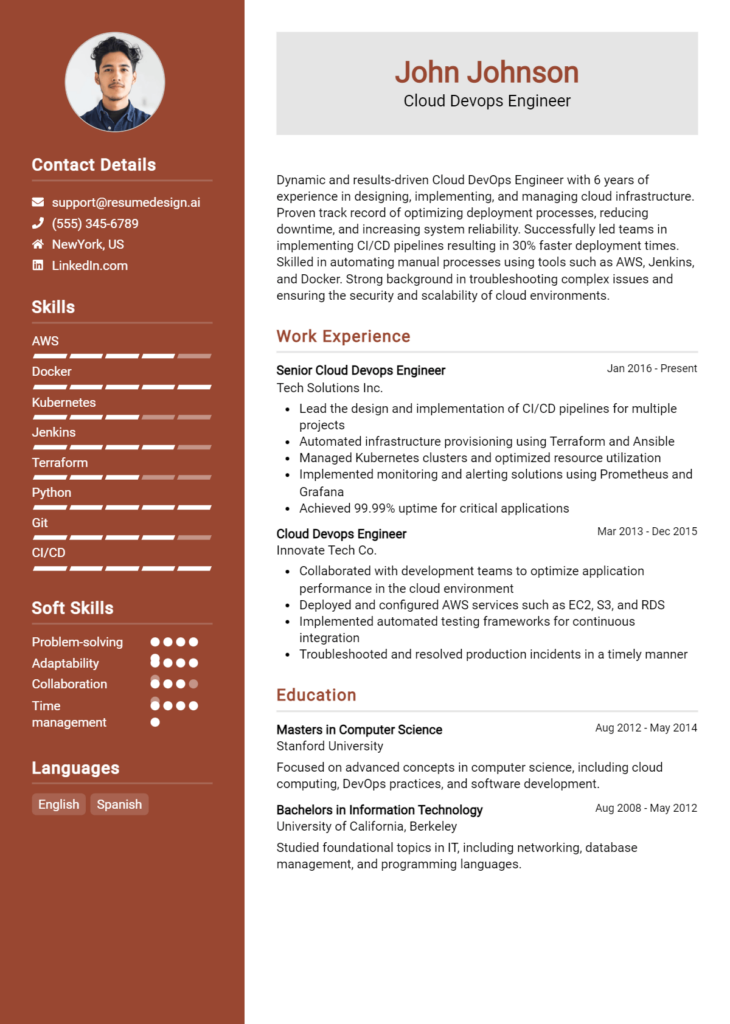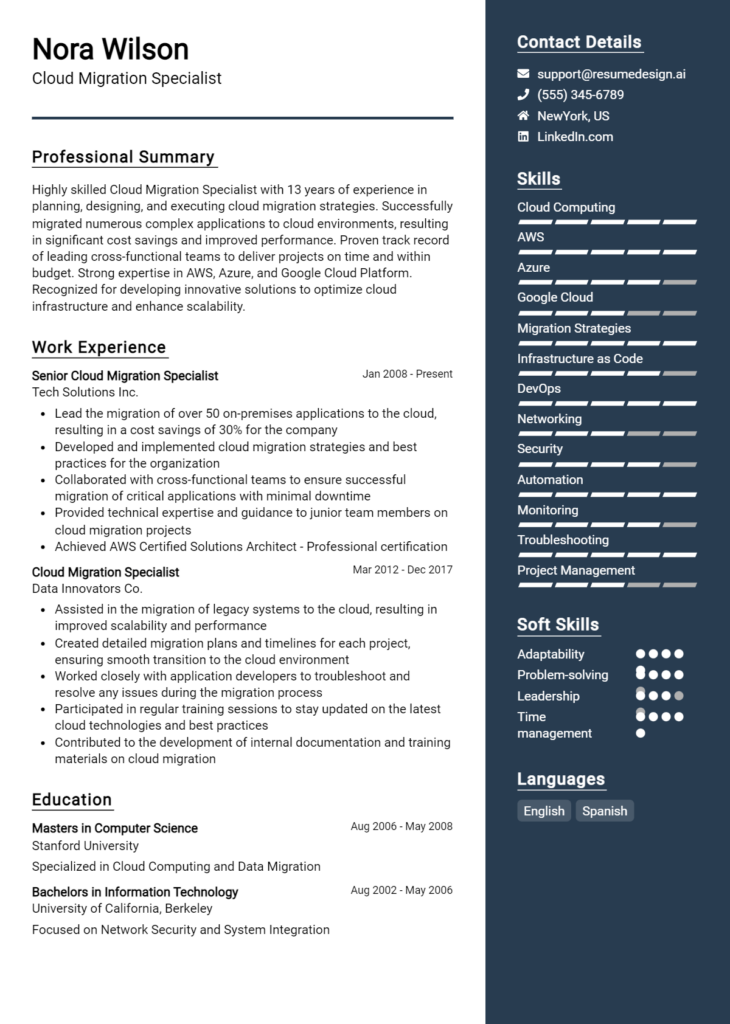Cloud Storage Engineer Core Responsibilities
A Cloud Storage Engineer plays a crucial role in managing and optimizing cloud storage solutions, ensuring data integrity, security, and accessibility across various departments. This position requires strong technical expertise in cloud platforms, operational knowledge of data management, and exceptional problem-solving skills. Collaborating with IT, security, and development teams, the engineer facilitates seamless data flow and supports organizational goals. A well-structured resume highlighting these competencies effectively illustrates the candidate's qualifications and potential contributions to the team.
Common Responsibilities Listed on Cloud Storage Engineer Resume
- Design and implement cloud storage solutions tailored to business needs.
- Monitor and optimize storage performance and capacity.
- Ensure data security and compliance with industry standards.
- Develop and maintain data backup and recovery strategies.
- Collaborate with cross-functional teams to integrate storage systems.
- Troubleshoot and resolve storage-related issues swiftly.
- Document storage architecture, processes, and policies.
- Stay updated with emerging cloud technologies and trends.
- Conduct regular audits to ensure data integrity and availability.
- Provide technical support and training to staff on storage tools.
High-Level Resume Tips for Cloud Storage Engineer Professionals
In today's competitive job market, a well-crafted resume is essential for Cloud Storage Engineer professionals. Your resume serves as the first impression you make on potential employers, and it needs to not only reflect your technical skills and achievements but also demonstrate your understanding of the cloud storage landscape. A strong resume can open doors to interviews and opportunities, showcasing your ability to contribute to an organization's success. This guide will provide practical and actionable tips specifically tailored for Cloud Storage Engineer professionals, ensuring you create a compelling document that stands out.
Top Resume Tips for Cloud Storage Engineer Professionals
- Tailor your resume to the job description by using relevant keywords and phrases found in the job posting.
- Highlight your experience with cloud storage solutions such as AWS S3, Google Cloud Storage, or Azure Blob Storage.
- Quantify your achievements by using metrics to demonstrate the impact of your work, such as reduced storage costs or improved data retrieval times.
- Showcase your understanding of data management, backup strategies, and disaster recovery processes.
- Include certifications relevant to cloud storage, such as AWS Certified Solutions Architect or Google Professional Cloud Architect.
- Demonstrate proficiency in scripting languages and tools that are vital for automation in cloud environments.
- Emphasize your experience in collaborating with cross-functional teams, as communication skills are vital in cloud projects.
- Incorporate any experience with compliance and security best practices related to cloud storage solutions.
- Utilize a clean, professional format that is easy to read and navigate, ensuring key information is readily accessible.
Implementing these tips can significantly enhance your chances of landing a job in the Cloud Storage Engineer field. A well-structured and targeted resume not only showcases your qualifications but also demonstrates your commitment to the role, making you a compelling candidate in the eyes of potential employers.
Why Resume Headlines & Titles are Important for Cloud Storage Engineer
In the competitive landscape of technology recruitment, a Cloud Storage Engineer's resume must stand out, and one of the most crucial elements in achieving this is the resume headline or title. A well-crafted headline serves as a powerful first impression, allowing candidates to immediately capture the attention of hiring managers. It succinctly summarizes the candidate's key qualifications and areas of expertise in a single impactful phrase. A strong headline is concise, relevant, and directly tied to the specific job being applied for, setting the stage for the rest of the resume and enhancing the candidate's visibility in a crowded applicant pool.
Best Practices for Crafting Resume Headlines for Cloud Storage Engineer
- Keep it concise: Aim for one impactful phrase that encapsulates your expertise.
- Be role-specific: Tailor your headline to reflect the specific position you're applying for.
- Highlight key skills: Include essential technical skills or certifications relevant to cloud storage.
- Use action-oriented language: Start with powerful verbs or descriptors that demonstrate your capabilities.
- Include years of experience: If applicable, mention your years of experience to provide context to your expertise.
- Showcase achievements: Incorporate measurable results or accomplishments that highlight your contributions.
- Avoid jargon: Use clear and straightforward language to ensure understanding across various readers.
- Revise for clarity: Edit your headline to ensure it is easy to read and understand at a glance.
Example Resume Headlines for Cloud Storage Engineer
Strong Resume Headlines
Cloud Storage Engineer with 5+ Years of Experience in Designing Scalable Solutions
Innovative Cloud Storage Specialist | Expert in AWS and Azure Implementations
Results-Driven Cloud Storage Engineer | Proven Track Record in Data Migration and Security
Weak Resume Headlines
Engineer with Experience
Cloud Storage Professional
The strong headlines are effective because they provide specific information about the candidate's experience, skills, and strengths in the field of cloud storage, making them immediately relevant to hiring managers. They convey a sense of professionalism and expertise, inviting further exploration of the resume. In contrast, the weak headlines suffer from vagueness and lack of detail. They fail to capture the candidate's unique qualifications or make a memorable impression, resulting in missed opportunities to connect with potential employers.
Writing an Exceptional Cloud Storage Engineer Resume Summary
A well-crafted resume summary is crucial for a Cloud Storage Engineer as it serves as the first impression for hiring managers. This brief yet impactful section can quickly capture their attention by showcasing key skills, relevant experiences, and notable accomplishments in cloud storage technologies. A strong summary should be concise and tailored specifically to the job at hand, effectively reflecting the candidate's qualifications and setting the tone for the rest of the resume.
Best Practices for Writing a Cloud Storage Engineer Resume Summary
- Quantify achievements wherever possible to demonstrate impact, such as "increased storage efficiency by 30%."
- Highlight specific technical skills relevant to cloud storage, such as proficiency in AWS, Azure, or Google Cloud Platform.
- Tailor the summary to align with the job description, using keywords that match the employer’s requirements.
- Keep it concise, ideally between 3-5 sentences, focusing on the most relevant information.
- Showcase relevant certifications or training that reinforce your expertise in cloud technologies.
- Use action-oriented language to convey confidence and proactivity in your roles.
- Include any notable projects or initiatives that demonstrate leadership or innovative thinking in cloud storage solutions.
Example Cloud Storage Engineer Resume Summaries
Strong Resume Summaries
Dynamic Cloud Storage Engineer with over 5 years of experience in architecting and managing scalable cloud storage solutions. Successfully migrated 100+ terabytes of data to AWS, improving accessibility and reducing operational costs by 25%.
Results-driven Cloud Storage Specialist skilled in optimizing storage performance and security. Led a team to implement a multi-region disaster recovery plan that decreased downtime by 40%, ensuring business continuity.
Dedicated Cloud Storage Engineer with expertise in Azure and GCP, specializing in data lifecycle management. Achieved a 50% reduction in storage costs through effective tiering strategies and automated data management processes.
Weak Resume Summaries
Cloud Storage Engineer with some experience in cloud technologies looking for a new opportunity.
Experienced professional in IT with knowledge of cloud storage systems and a desire to work in a challenging environment.
The strong resume summaries effectively highlight specific achievements, quantify results, and demonstrate a clear alignment with the role of a Cloud Storage Engineer. They use concrete examples to illustrate the candidate's impact in previous positions. In contrast, the weak summaries lack detail, do not provide measurable outcomes, and fail to convey a strong sense of direction or relevance to the job, making them less appealing to hiring managers.
Work Experience Section for Cloud Storage Engineer Resume
The work experience section of a Cloud Storage Engineer resume is crucial as it serves as a comprehensive showcase of the candidate's technical skills and professional accomplishments. This section not only highlights the individual’s ability to design, implement, and manage cloud storage solutions but also emphasizes their experience in leading teams and ensuring the delivery of high-quality products. By quantifying achievements—such as improvements in system performance or cost savings—and aligning experiences with industry standards, candidates can effectively demonstrate their value to potential employers in a competitive job market.
Best Practices for Cloud Storage Engineer Work Experience
- Clearly outline technical skills relevant to cloud storage technologies, such as AWS S3, Azure Blob Storage, or Google Cloud Storage.
- Use quantifiable metrics to illustrate achievements, like percentage improvements in storage efficiency or reductions in downtime.
- Highlight experience with data migration projects and the tools used to facilitate these processes.
- Showcase collaboration with cross-functional teams, emphasizing communication and project management abilities.
- Include specific examples of troubleshooting complex storage issues and implementing solutions.
- Detail certifications or training related to cloud technologies to bolster credibility.
- Align experiences with industry standards and best practices in cloud storage management.
- Utilize action verbs to begin bullet points, making contributions more impactful and engaging.
Example Work Experiences for Cloud Storage Engineer
Strong Experiences
- Led a team of 5 engineers in a successful migration of 200TB of data to AWS S3, resulting in a 30% reduction in storage costs and a 20% increase in retrieval speeds.
- Developed a cloud storage solution that improved data accessibility by 40% for over 300 users, facilitating better collaboration across departments.
- Implemented a disaster recovery strategy that decreased recovery time objectives (RTO) by 50%, ensuring business continuity during outages.
- Collaborated with cross-functional teams to design and deploy a multi-region cloud storage architecture, enhancing system reliability and performance by 25%.
Weak Experiences
- Worked on cloud storage projects.
- Participated in team meetings about cloud solutions.
- Assisted with the management of cloud storage systems.
- Helped improve data storage processes.
The examples provided are considered strong because they include specific, quantifiable outcomes and demonstrate leadership and collaboration in cloud storage projects. They articulate clear achievements and technical contributions, making the candidate’s impact evident. In contrast, the weak experiences lack detail and specificity, making it difficult for potential employers to gauge the candidate's actual skills and contributions. Without quantifiable metrics or clear responsibilities, these statements fail to convey the candidate's value effectively.
Education and Certifications Section for Cloud Storage Engineer Resume
The education and certifications section in a Cloud Storage Engineer resume is crucial for demonstrating the candidate's academic foundation, specialized knowledge, and commitment to ongoing professional development. This section not only showcases relevant degrees and industry-recognized certifications but also highlights the candidate's dedication to staying current with the latest technologies and best practices in cloud storage. Employers often prioritize candidates who have pursued relevant coursework and specialized training, as these credentials greatly enhance the candidate's credibility and alignment with the job role.
Best Practices for Cloud Storage Engineer Education and Certifications
- Prioritize relevant degrees in Computer Science, Information Technology, or related fields.
- Include industry-recognized certifications such as AWS Certified Solutions Architect or Google Cloud Professional Cloud Architect.
- Highlight any specialized training or courses related to cloud storage solutions, data management, and security.
- Be specific about the level of education (e.g., Bachelor's, Master's, PhD) and the name of the institution.
- List certifications in chronological order, starting with the most recent.
- Include any hands-on projects or coursework that involved real-world applications of cloud storage technologies.
- Update the section regularly to reflect new certifications or relevant courses completed.
- Consider adding any online courses or boot camps that are recognized in the industry to showcase a commitment to continuous learning.
Example Education and Certifications for Cloud Storage Engineer
Strong Examples
- Bachelor of Science in Computer Science, XYZ University, 2020
- AWS Certified Solutions Architect – Associate, 2022
- Google Cloud Professional Cloud Architect, 2023
- Specialized Coursework: Cloud Storage Solutions and Data Security, ABC Online Academy, 2021
Weak Examples
- Associate Degree in General Studies, DEF College, 2018
- Certification in Microsoft Office, 2019
- Diploma in Computer Networking (outdated), GHI Institute, 2016
- Basic HTML and CSS Course, 2020
The examples provided serve to illustrate the distinction between strong and weak qualifications in the context of a Cloud Storage Engineer. Strong examples reflect relevant degrees and certifications that align directly with the skills and knowledge required for the role, showcasing the candidate's preparedness for the position. In contrast, weak examples highlight outdated or irrelevant qualifications that do not contribute to the candidate's expertise in cloud storage engineering, potentially detracting from their overall appeal to employers.
Top Skills & Keywords for Cloud Storage Engineer Resume
As the demand for cloud storage solutions continues to grow, the role of a Cloud Storage Engineer has become increasingly critical. A well-crafted resume for this position should highlight a blend of technical and interpersonal skills that demonstrate proficiency in managing cloud storage systems. Employers look for candidates who not only possess the necessary technical know-how but also exhibit strong problem-solving abilities, communication skills, and teamwork. By showcasing relevant skills effectively, candidates can significantly enhance their chances of landing interviews and advancing their careers in this dynamic field.
Top Hard & Soft Skills for Cloud Storage Engineer
Soft Skills
- Excellent communication skills
- Problem-solving abilities
- Team collaboration
- Adaptability to new technologies
- Attention to detail
- Time management
- Customer service orientation
- Critical thinking
- Conflict resolution
- Creativity in finding solutions
Hard Skills
- Proficiency in cloud platforms (AWS, Google Cloud, Azure)
- Knowledge of cloud storage architecture and services
- Experience with data backup and recovery solutions
- Familiarity with storage protocols (NFS, iSCSI, SMB)
- Understanding of data security and compliance regulations
- Skills in scripting and automation (Python, Bash)
- Experience with database management systems
- Knowledge of virtualization technologies
- Familiarity with DevOps practices
- Expertise in performance tuning and optimization
By emphasizing both hard skills and soft skills on your resume, along with relevant work experience, you can present yourself as a well-rounded candidate capable of meeting the challenges of a Cloud Storage Engineer role.
Stand Out with a Winning Cloud Storage Engineer Cover Letter
Dear Hiring Manager,
I am writing to express my interest in the Cloud Storage Engineer position at [Company Name], as advertised on [where you found the job listing]. With a robust background in cloud architecture, data management, and storage solutions, combined with my passion for optimizing data accessibility and security, I am excited about the opportunity to contribute to your team. My experience in designing and implementing scalable storage solutions aligns well with the innovative projects at [Company Name].
In my previous role at [Previous Company Name], I successfully led a team in migrating over 10 terabytes of data to a cloud storage platform, enhancing data retrieval speeds by 30% while significantly reducing costs. I am proficient in a range of cloud technologies, including AWS, Azure, and Google Cloud, and have hands-on experience with tools such as Terraform and Kubernetes for infrastructure management. My strong analytical skills enable me to assess storage needs accurately and devise effective solutions that not only meet current requirements but also anticipate future growth.
Collaboration is key in my approach to engineering, and I have a proven track record of working closely with cross-functional teams to ensure seamless integration of cloud storage systems. I believe that communication is vital, and I always strive to convey complex technical concepts in an understandable manner. I am particularly drawn to [Company Name] because of your commitment to innovation and excellence in cloud services, and I am eager to bring my expertise to enhance your storage capabilities.
Thank you for considering my application. I am looking forward to the opportunity to discuss how my skills and experience can contribute to the success of your cloud storage initiatives at [Company Name]. Please feel free to contact me at your earliest convenience to schedule a conversation.
Sincerely,
[Your Name]
[Your Contact Information]
Common Mistakes to Avoid in a Cloud Storage Engineer Resume
When applying for a position as a Cloud Storage Engineer, crafting an effective resume is crucial to standing out in a competitive job market. However, many candidates make common mistakes that can undermine their chances of securing an interview. Avoiding these pitfalls can significantly enhance the quality of your resume and present your skills and experiences in the best possible light. Here are some common mistakes to be aware of:
Generic Objective Statement: Using a vague or generic objective statement can make your resume appear less tailored. Instead, craft a specific statement that reflects your skills and aspirations in cloud storage engineering.
Lack of Relevant Keywords: Many companies use applicant tracking systems (ATS) to filter resumes. Failing to incorporate relevant keywords related to cloud storage technologies and practices can result in your resume being overlooked.
Ignoring Soft Skills: While technical skills are crucial, cloud storage engineers also need strong communication and problem-solving skills. Neglecting to highlight these soft skills can give an incomplete picture of your capabilities.
Not Quantifying Achievements: Simply listing responsibilities without quantifying your achievements can make your contributions appear less impactful. Use metrics and specific examples to showcase how you have improved processes or efficiencies.
Overlooking Certifications: Cloud storage technologies often come with specific certifications. Failing to mention relevant certifications can diminish your credibility and make it harder for hiring managers to gauge your expertise.
Inconsistent Formatting: A resume that lacks consistent formatting can be distracting and difficult to read. Ensure that fonts, bullet points, and spacing are uniform throughout to maintain a professional appearance.
Focusing on Outdated Technologies: The tech landscape evolves rapidly. Highlighting experience with outdated technologies may lead employers to question your relevance in the current market. Instead, focus on recent technologies and trends in cloud storage.
Neglecting Continuous Learning: The field of cloud computing is ever-changing. Not demonstrating your commitment to continuous learning, such as recent courses or workshops, can convey a lack of initiative in keeping your skills current.
Conclusion
As we conclude our exploration of the Cloud Storage Engineer role, it's important to highlight the essential skills and experiences that define success in this field. A Cloud Storage Engineer is responsible for designing, implementing, and managing cloud storage solutions that ensure data accessibility, security, and scalability. Key competencies include expertise in cloud platforms (such as AWS, Azure, or Google Cloud), proficiency in data management and migration, as well as a solid understanding of networking and security principles.
Additionally, familiarity with automation tools and scripting languages can significantly enhance your effectiveness in this role. Staying current with industry trends and emerging technologies is also crucial, as the cloud landscape is continually evolving.
To ensure your resume reflects your qualifications and stands out to potential employers, we encourage you to take a moment to review and update it. Utilize available resources to enhance your application materials. Explore resume templates for a polished look, use the resume builder for a streamlined creation process, and check out resume examples for inspiration. Don’t forget to craft an impactful introduction with our cover letter templates. Your next opportunity as a Cloud Storage Engineer could be just around the corner!

